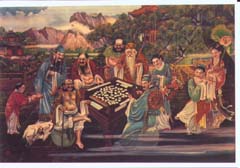NEW CRITIQUES
http://www.mahjongnews.com
Mahjong News - The Independent Mahjong Newspaper
By Marisa PjerrouAll the hype surrounding video and computer based action, and fantasy or adventure games tends to obfuscate other types of popular gaming that have long been in existence with their own sets of communities and aficionados. The Chinese game of mah jong may garner less media attention than youth-marketed video and computer games, but it has long had a loyal following of its own. The Internet has helped to popularize this large but somewhat exclusive gaming community; now it possible for people who have never heard of mah jong to learn about it and play it on the web.
If you've ever walked through a Chinese community in the summer - such as Oakland, California's Chinatown, for example - and have heard through open windows the sounds of tiles crashing into one another and intermittent lively conversation, chances are what you heard was a real live mah jong game taking place. Don't be fooled by the bastardized software versions of mah jong sold in many computer stores on CD-ROMs as solitaire or concentration-type games; these have absolutely nothing to do whatsoever with what authentic mah jong is about! Real mah jong is a game of Chinese origin requiring four players and a special set of tiles with suits of either circles, bamboo or Chinese numbers on them; it is a game often described as being similar to Rummy card games. The historical origins of mah jong can be traced as far back as the Sung (960-1279 AD) and Ming (1368-1644 AD) Dynasties, with the actual game creation being accredited to two brothers in the city of Ningpo, circa 1850.
The introduction of mah jong to the United States in the 1920's set off a game-playing craze in American society that eventually simmered down but never completely went away: mah jong is surprisingly still a game popular in the U.S. with many non-Asian people. Organizations such as The American Mah-Jongg Association (http://amja.net/) and The National Mah Jongg League (http://nationalmahjonggleague.org) hold regular mah jong tournaments across the country and even host special mah jong cruise vacations! A 1997 Wall Street Journal article by Chana R. Schonenberger (http://www.mahjongg.com/wsjart.htm) describes the game as being currently "back in vogue" in having developed "a new and wider following among the young and techno-savvy, many of whom discover the game on the Internet."
Mah jong is a popular past time with many of my family members who are originally from Hong Kong (and some of whom still reside there); it is obsessively played whenever the opportunity arises. So I was curious to look for online versions of mah jong, especially for interactive, multi-player versions. Entering the word "mah jong" into any search engine mostly pulls up casino websites. After sorting through a lot of this kind of junk, the best website I found describing mah jong game sites was Mahjong News: The Independent Internet Mahjong Newspaper (http://www.mahjongnews.com/), which provides good descriptions of current mah jong software and online mah jong game sites. Here
I discovered a link to GameZoneX (http://www.gamezonex.com/) that has a cartoonish Nintendo-type graphics mah jong game in which you play against very cute-looking characters. But GameZoneX's mah jong is still in the development stage or just non-functioning - it couldn't be opened. Also, unbeknownst to me was the exciting information that Yahoo! Games has online mahjong (http://games.yahoo.com/), in

which you can participate in multi-player real time mah jong. I tried a few rounds in the beginner section and had a great time! Although I was too focused on which tile to pung, chow or discard to try out the chat feature - which permits you to dialogue with other game players at your table. I also discovered the "invincible" MahKing game that almost sounds like mah jong's version of chess' Deep Blue. For those who dare to be brave, this "ultimate mah jong game" can be played online also in multi-player versions at the World Mahjong Players Association website (http://www.wmpa.net/).I don't foresee true mah jong diehards giving up their mah jong sets and chances to play with one another anytime soon because they've discovered online mah jong. The true appeal of mah jong seems to reside in the social aspect of playing the game live with real people; Internet and software based mah jong will more than likely remain as an enhancement but not replacement to the real game. After all, the tactile nature of manipulating the mah jong tiles, interacting with others, and of course pressuring and insulting your opponents is all a part of the "real" mah jong experience.